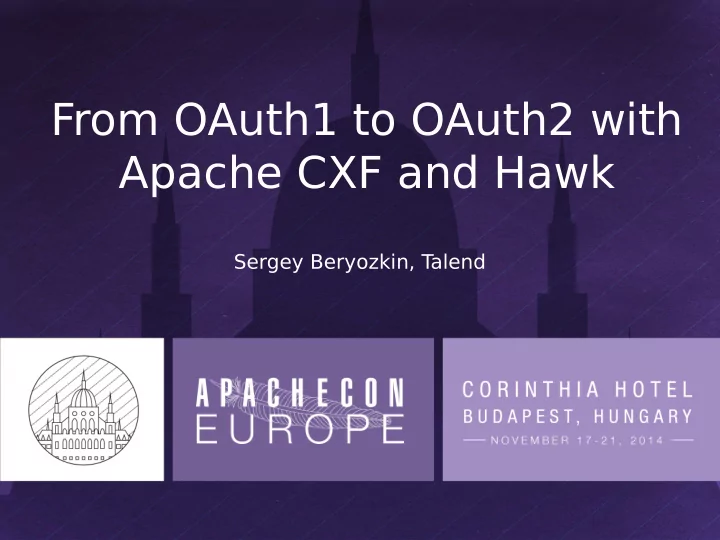

From OAuth1 to OAuth2 with Apache CXF and Hawk Sergey Beryozkin, T alend
What is Apache CXF ? ● Production quality Java framework for developing REST and SOAP web services ● CXF 3.0.2: JAX-RS 2.0, JAX-WS 2.2 ● Major focus on the web services security: WS-Security, OAuth1/2, JOSE, immediate and public reaction to security issues ● Active community, healthy project environment
What is OAuth ? ● Allows third party clients such as web servers or mobile applications to access server resources on behalf of their owner ● Owners authorize the access via the redirection without sharing their secrets ● Major theme in the HTTP services world: drives relevant innovations, popularises the subject of web security, helps enrich the applications
History of OAuth ● 1.0: Eran Hammer-Lahav, RFC 5849, Apr 2010, implemented by many providers ● 2.0: The working group starts its work, Eran joins and eventually leaves ● 2.0: RFC 6749 is released in Oct 2012 ● 2.0: Actively supported, many related enhancements are being developed ● The 1.0 vs 2.0 controversy is lingering
OAuth1 Diagramm
Key OAuth1 Features ● Classic fmow requires a 3-step 'dance': getting a temp request token, getting an authorization verifjer, exchanging the temp token and the verifjer for the access token ● Support for Proof Of Possession and the 'best efgort' data and replay protection with the clients using its secret and token keys to create a signature
OAuth1 Pros, Cons and Praise ● Proved to be functional and popular, opened a new chapter in the world of secure HTTP services: Great Efgort ! ● PoP, data integrity and replay protection ● 3-step dance is complex, simpler fmows are not standardized ● Only SHA1 signature algorithms; keys are sent over TLS but only in plain text
OAuth2 Code Diagramm
Brief OAuth2 Overview ● Authorization code fmow is simpler than OAuth1: a step involving a temp token request is dropped ● Many fmows, grant and token types ● Some fmows require the extra care (implicit fmow), no PoP from the get go ● OAuth2 drives a lot of the innovation (OIDC, can utilize JOSE, etc), it will stay
From OAuth1 to OAuth2 ● Developers who like OAuth1 value the PoP feature but OAuth2 does not have a standardized PoP scheme yet... (wait for a later slide though :-)) ● Actually, Eran did author a MAC token draft before he left the OAuth2 group... ● OAuth2 is very extensible – non standard authentication schemes are OK, so...
What is Hawk ● Eran and others did work on the MAC scheme and how it can be used with OAuth2 (draft-hammer-oauth-v2-mac- token-05, see Links) ● Hawk has its roots in that spec; it is a new scheme, better version of OAuth1 scheme; documented not to be related to OAuth2, no reason not to use it when migrating to OAuth2 though :-)
What does Hawk Client do ? ● The Hawk client gets a secret (MAC) key out-of-band ● The Hawk client creates a Hawk scheme: “Authorization: Hawk id="...", ts="...", nonce="...", mac="..."” ● The sequence capturing various request properties, a body hash, is signed ● hueniverse/hawk at GitHub for more info
OAuth2 Access T oken and Hawk ● “{ “access_token”:”123”, “token_type”:”hawk”, “secret”:”678” }” ● Authorization: Hawk id=”123” mac=”...” ● OAuth2 'access_token' -> Hawk 'id' ● OAuth2 'secret' -> is distributed to the client as part of the token response and used to calculate a Hawk 'mac' hash ● OAuth2 PoP will work, Hawk is here now.
Apache CXF and OAuth2 ● OAuth2 runtime encapsulates most of the work a typical OAuth2 server will do. ● AuthorizationCode, ImplicitGrant and AccessT oken JAX-RS services; pluggable grant and session handlers, validators, token and code response post-processors ● Developers are mainly focused on getting the data stored only
Apache CXF, OAuth2 and Hawk ● Server: ServerAccessT oken token = new HawkAccessT oken(...HmacSHA256); ● Client: calculates the hash with the help of the Client utilitity code (Code example...)
The Demo
The Demo Continued
OAuth2 and PoP: the latest ● Draft-bradley-oauth-pop-key-distribution- 01: symmetric and asymmetric PoP keys, keys are JWK formatted, Hmac, RSA-SHA, Elliptic key signatures ● PoP keys can be JWE-encrypted ● Draft-richer-oauth-signed-http-request-01 – how the signatures can be done ● More sophisticated and capable PoP
OAuth2 and PoP: alternatives ● Use 2-way TLS (client certifjcates) to authenticate ● Use JWS to protect the integrity of the actual payload ● Use JWE to protect the sensistive content ● Combine TLS, JWE and JWS if really needed
Additional Resources ● More about CXF Security at Apache Con, 17 Nov: Dennis Sosnoski, “CXF Security and Reliability”, 13.40 Andrei Shakirin, “Secure Services with Apache CXF”, 16.50 ● CXF: http://cxf.apache.org/docs/jax-rs-oauth2.html ● Hawk: https://github.com/hueniverse/hawk ● OAuth2 PoP: http://tools.ietf.org/html/draft-bradley-oauth-pop-key-di stribution-01
Questions ?
Thank You
Recommend
More recommend